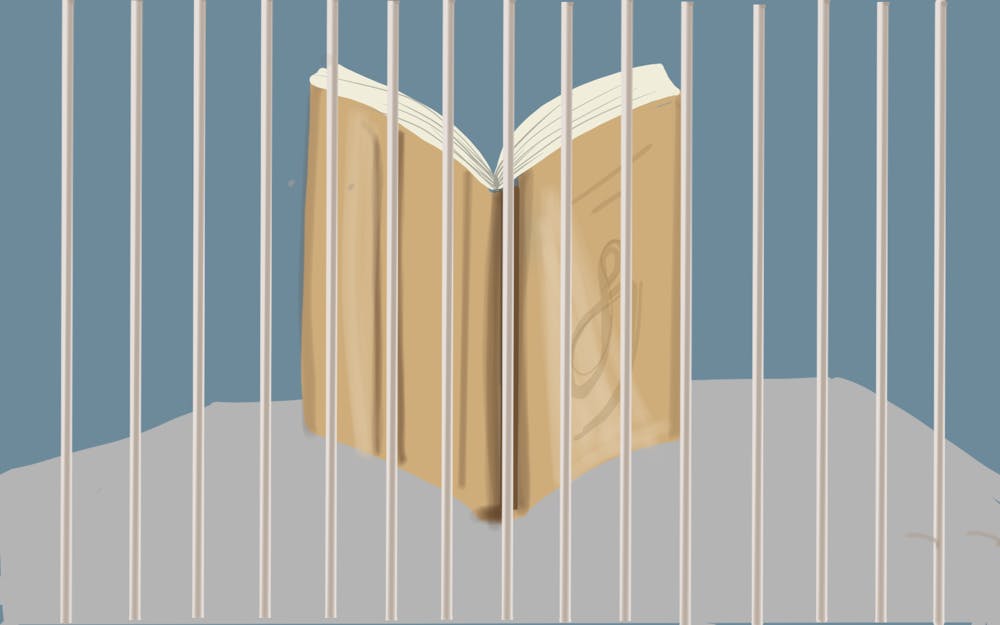Editor’s Note: This story includes mention of potentially triggering situations, such as hate crimes and antisemitism.
“Sexual conduct.” “Inappropriate.”
What book is this, you might ask? It’s a book that in America, including here in Indiana, has been banned since the 1970s. Even today, it continues to be challenged and yanked from library shelves and classrooms. This book has caused uproar and lawsuits, controversy and more.
It was the dictionary.
Specifically, the American Heritage Dictionary. In 1976, schools in both Indiana and Alaska banned this dictionary on the grounds that it contained inappropriate entries, such as the word “bed” as a verb. In January of this year, Florida school district Escambia County schools removed similar editions of the book, specifically the Merriam-Webster edition, as well as an estimated 1,600 other titles over concerns that they don’t comply with the controversial House Bill 1069. This bill is an expansion of Florida’s “Don't Say Gay” House Bill 1557, adding provisions which “prohibit the use of pronouns consistent with one’s gender identity, expand book banning procedures, and censor health curriculum and instruction.”
The nonprofit organization PEN America, along with a multitude of county students and parents, have since sued Escambia County school board for violating the First Amendment and Equal Protection Clause of the Fourteenth Amendment.
PEN America defines a school book ban as “any action taken against a book based on its content and as a result of parent or community challenges, administrative decisions or in response to direct or threatened action by lawmakers or other governmental officials.” This results in students being unable to access these books, or at least limiting their availability.
Book bans are executed on a local level by school boards, made up by members of the community who take an oath to uphold the Constitution of the United States. As such, school board members are active agents of government, responsible for upholding the rights of the citizens they represent. Any action on their part to limit their constituents' access to books prevents free speech, therefore violating the First Amendment.
According to an article from the Guardian, more books were banned in 2023 in US schools and libraries than any other year that records have been kept. The American Library Association’s Office for Intellectual Freedom “documented 4,240 unique book titles targeted for censorship in 2023, more than the previous two years combined: 2,571 in 2022 and 1,651 in 2021. There was a 65% spike in 2023 over 2022.”
Moreover, it is impossible to have a conversation about censorship without discussing who is being censored. Out of the books challenged in 2023, the authors whose books were targeted were “most frequently female, people of color, and/or LGBTQ+ individuals.” The report found that “30% of banned books included characters of color and themes of race and racism, 30% represented LGBTQ+ characters or themes and 6% included a transgender character.”
This is one of the concerns being brought by PEN America against the Escambia County school board. The plaintiffs allege that because the books being singled out for possible removal are disproportionately books by non-white and/or LGBTQ+ authors, or which address topics related to race or LGBTQ+ identity, the book bans violate the Equal Protection clause of the Fourteenth Amendment.
Book bans perpetuate a cycle of marginalization and oppression of minority groups. They deny people their right to access information and express themselves. It's undemocratic and unconstitutional. What book ban proponents fail to see is that the students they are attempting to “save” by challenging books are living those stories themselves. These aren't just books; they are the lived experiences of their readers too. The youth of America deserve to see themselves represented in literature, no matter their gender, color of their skin or the people they love.
Banning books is banning the stories of women, people of color and LGBTQ+ people. Banning these books prevents students from having the opportunity to understand their own identity and the world around them. It also intentionally sends the message that their stories are not worthy of attention and respect. Book ban proponents want to pretend that these people do not exist, but they do, and they deserve to have their stories told.
While bans are certainly on the rise here in America, historically, it’s nothing new.
In fact, there was a rather famous book banning in Germany on May 10, 1933, when university students in 34 towns burned more than 25,000 books. Among the blaze were banned American authors like Ernest Hemingway and Helen Keller, along with Jewish authors. Onlooking students gave the Nazi salute.
In the weeks that led up to the burning, word began to spread about what the students planned to do. As her books were bound for the bonfires, Helen Keller confronted these students in an open letter:
"History has taught you nothing if you think you can kill ideas.”
Ainsley Foster is a sophomore studying elementary education.






